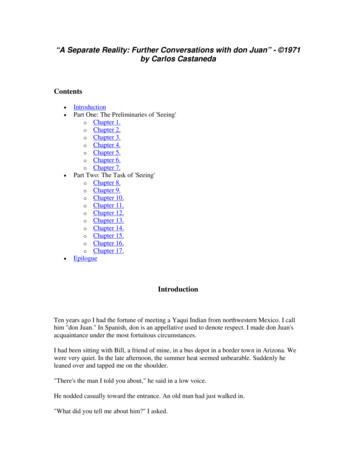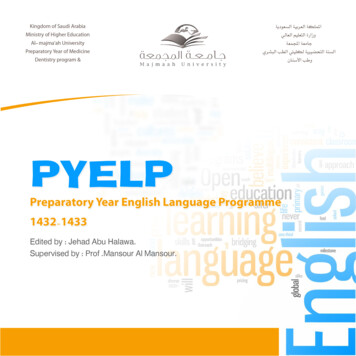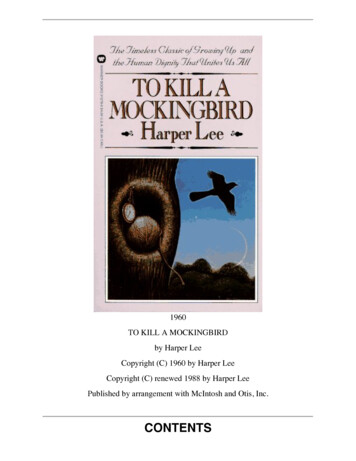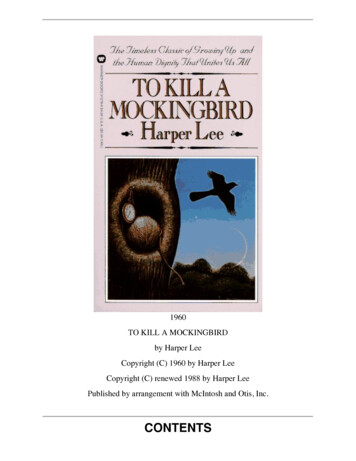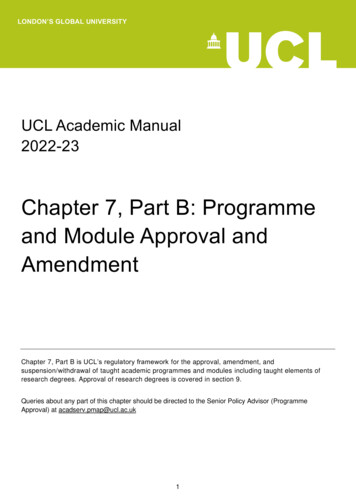
Transcription
LONDON’S GLOBAL UNIVERSITYUCL Academic Manual2022-23Chapter 7, Part B: Programmeand Module Approval andAmendmentChapter 7, Part B is UCL’s regulatory framework for the approval, amendment, andsuspension/withdrawal of taught academic programmes and modules including taught elements ofresearch degrees. Approval of research degrees is covered in section 9.Queries about any part of this chapter should be directed to the Senior Policy Advisor (ProgrammeApproval) at acadserv.pmap@ucl.ac.uk1
2
Introduction1.2.University College London (UCL) must operate effective processes for the design,development and approval of programmes of study in order to discharge fully itsresponsibilities for setting and maintaining academic standards and assuring and enhancingthe quality of learning opportunities.Queries about any part of this chapter should be directed to the Senior Policy Advisor(Programme Approval) at acadserv.pmap@ucl.ac.uk.Purposes1.The main purposes of this chapter are to ensure that:a)Threshold academic standards are met through the approval and amendmentprocesses;b)The appropriate quality of student learning opportunities are available for all taughtprovision;c)The information provided to students about their studies is complete with regard toprogramme structure and learning outcomes;d)The value of qualifications awarded to students at the point of qualification and over timeis in line with sector-recognised standards;e)Due account is taken of internal and external reference points in the approval andamendment processes;f)Robust procedures are followed when modules or programmes are suspended orwithdrawn;g)All new taught provision is viable financially, and in terms of student recruitment.Reference Points1.2.3.4.This chapter is drafted with reference to the UK Quality Code for Higher Education.This chapter should be read in conjunction with the rest of the Academic Manual, in particular:a)Chapter 1: Student Recruitment and Admissionsb)Chapter 3: Registration Framework for Taught Programmesc)Chapter 4: Assessment Framework for Taught Programmesd)Chapter 5: Research Degrees Frameworke)Chapter 7, Part A: Qualifications and Credit Frameworkf)Chapter 8: Academic Partnerships FrameworkThis chapter should be read in conjunction with the Education Planning pages of the UCLTeaching and Learning portal.The strategic context for taught provision can be found in the following documents:a)UCL 2034b)Education Strategy 2022-27c)Connected Curriculum3
Terminology1.2.Key to abbreviations:DTCDepartmental Teaching CommitteeFHEQThe Frameworks for Higher Education Qualifications of UK Degree-AwardingBodiesFTCFaculty Teaching CommitteePMAPProgramme and Module Approval PanelPSRBProfessional, Statutory or Regulatory BodyQAAQuality Assurance AgencyFPCFinancial Performance CommitteeSNPStudent Numbers PlanningThroughout this chapter, the term ‘Department’ is used to refer to relevant units below theFaculty level (e.g. Institute or Division).4
Approval of New Taught Programmes1.2.3.New taught programmes are approved by the UCL Education Committee under powersdelegated from the UCL Academic Board. The Education Committee is advised by theProgramme and Module Approval Panels (PMAP).Programme planning is the first phase with new proposals considered through the StudentNumbers Planning process with the mandate for further development granted by FinancialPerformance Committee. Design, development and approval takes place in two stages:Outline Approval, which is granted by the relevant Faculty Teaching Committee; FinalApproval, which is granted by the Education Committee.Faculties and Departments may adopt local practices in addition to those outlined below, suchas the involvement of additional committees or the Vice-Dean(s) Education. However, PMAPwill continue to require sign-off from the named individuals and groups listed in theProgramme Proposal form.Timelines for the Approval of Taught Programmes1.2.3.4.5.For marketing of programmes to be given the best opportunity to attract the highest qualitystudents, for programmes to be included in the prospectus, and for UCL to uphold itsresponsibilities with respect to consumer protection legislation, the following deadlines areessential:a) For undergraduate programmes:Final Approval should be achieved not later than November of the calendar year two yearsprior to the intended start of a programme (22 months in advance of a September start).b) For postgraduate programmes:Final Approval should be achieved not later than the end of June in the year prior to theintended start of a programme (15 months in advance of a September start).Where it has not been possible to meet the deadlines outlined above, final approval must beachieved not later than the end of September in the year prior to the intended start of aprogramme (12 months in advance of a September start).While these are the very latest deadlines, programme initiators should be encouraged to beginwork on programme development and Outline Approval much earlier to give sufficient time for:effective competition/market appraisal (both within and outside of UCL); development andapproval of the business case; obtaining Faculty approval. Programme initiators should aspireto the timelines outlined in Annex 7.1.1: Detailed timelines for Programme Approval andAmendment.Prior to embarking on the process towards outline approval, the full business case for newprogramme proposals including the additional student numbers must be considered as part ofthe Student Numbers Planning (SNP) process and approved by the Financial PerformanceCommittee (FPC). The FPC meets regularly throughout the year and the specific date for FPCconsideration of any given programme will be agreed with the VP (Strategy) normally as partof the SNP meeting in July. This is a new requirement from 2022/23.Programme initiators should note that FPC approval is required prior to the consideration ofOutline Approval at a PMAP meeting. New programme proposals at Outline Approval Stagemust be submitted no less than 10 working days in advance of a meeting. Submissionsreceived later than 10 working days in advance of a meeting will be considered at asubsequent meeting of the Panel. A comprehensive list of the dates on which PMAP will meetin 2022-23, as well as the corresponding paper deadlines, can be found in Annex 7.1.2: PMAP2022-23: Meeting Dates and Paper Deadlines.5
Initial Programme Development1.2.3.4.The intention to develop a new programme should be reflected in the relevant department’sstrategic plan and should be included in the Faculty’s strategic operating plan. This ensuresthat any projected increase in student numbers and/or required funding for staffing andlearning resources is anticipated.In addition, new programmes and their planned student numbers should be included in thestudent numbers planning submission as part of the annual Student Numbers Planningexercise. In year changes to student intake plans can be made using the Change Requestprocess.Programme initiators must consider how their programme contributes to the achievement ofUCL’s strategic aims and objectives as detailed in: UCL 2034; the Education Strategy 2022-27and the Global Engagement Strategy as well as considering how the programme will embedequality, diversity and inclusion.A programme proposal is usually initiated and developed at department level, in closeconsultation with relevant members of staff in the Faculty (usually the Faculty Tutor).Programme initiators should consult with the following relevant parties or documents whendeveloping their programme proposal: Head of Department; Faculty Dean (or nominee such as Vice Dean Education); Faculty Tutor; The MarComms team in Office of the Vice-President (External Engagement), includingthe Director of Faculty Marketing; the Faculty Head of Marketing and Communicationsand Departmental colleagues responsible for Communications and Marketing; Departmental colleagues and colleagues in other cognate disciplines; Current or former students studying in cognate areas; School Finance Director; UCL Planning team; UCL Estates team; UCL Arena Centre – for advice on learning, teaching and assessment practice; Library Services; Digital Education; Online and Lifelong Learning; Study Abroad Office and Visa Compliance team – for programmes with an optional orcompulsory period of study abroad; Placement Information Pack for programmes that include an optional or compulsoryperiod of placement (For further information on the pack, please refer to Chapter 8 of the2022-23 UCL Academic Manual); Academic Partnerships Review Group (APRG) – for programmes that will be delivered inpartnership with others; UCL Apprenticeships Steering Group – for Level 7 / Masters apprenticeship programmes.(For further information on Level 7 / Masters apprenticeships, please refer to Chapter 11of the 2022-23 UCL Academic Manual); External colleagues and members of industry; Any professional, statutory or regulatory bodies; The UK Quality Code for Higher Education, developed by the Quality Assurance Agency(QAA) for Higher Education; The Office for Students (OfS) advice and guidance; Other relevant central services (such as Academic Services).6
Programme Structure1.2.3.4.5.Information on the level, structure and components of a programme of study, as well as a listof the approved qualifications, and their threshold requirements, can be found in Chapter 7,Part A: Qualifications and Credit Framework.Information on programme length and modes of attendance can be found in Chapter 3,Registration Framework for Taught programmes.Assessment, progression, award and classification should follow the regulations set out inChapter 4, Assessment Framework for Taught Programmes.Where a programme is made up of multiple routes or pathways leading to different namedqualifications, the programme diet and statements of aims and learning outcomes must beclear for each.Interim qualifications are available for all UCL programmes. It is possible to offer these interimqualifications as programmes of study, either connected to a larger award or as standaloneprogrammes. In such cases, a programme summary must be maintained for each programme.Material Programme Information1.2.3.During the development stage, programme initiators should be mindful of the need to provideclear, accessible and accurate information to prospective and current students on the purpose,structure and aims of their programme.Additionally, UCL is obliged, under the Quality Code and under consumer protectionlegislation, to provide clear and accurate information to prospective students and offer holders.Therefore, programme initiators must identify the following when designing a new programme:a) the level of the programme within the Framework for Higher Education Qualifications;b) the intended qualification and any interim qualifications;c) the programme title;d) the overall credit value;e) the programme’s aims, objectives and learning outcomes (with reference to relevantsubject benchmark statements);f) the entry requirements (both academic and non-academic);g) the programme’s structure, including the number and type of contact hours, anycompulsory modules, an indication of likely optional modules and the expected workload;h) the overall methods of assessment (both formative and summative);i) the duration of the programme and its modes of study;j) the location(s) of study, including where relevant, any distance learning;k) whether the programme could be accredited by a PSRB;l) whether the programme will be offered in partnership with others;m) whether the programme will have a period in placement or study abroad;n) an initial assessment of the tuition fees to be charged (in consultation with the Dean ornominee);o) any additional costs to students (such as field trips or material costs);p) any barriers to accessibility and how these could be mitigated.The required documents for programme proposals provide space for the programme initiatorto record this information.Business Plan and Market Research1.As detailed in 2.2 Initial Programme Development Section 3, all programme proposals requireapproval by the Faculty and the Financial Performance Committee (FPC) prior toconsideration of Outline Approval by the Department, the Faculty and PMAP and prior to7
2.3.completion of the detailed programme proposal. Documents required by FPC and as part ofthe SNP process can be found at the UCL Planning Team Sharepoint and are:a. The Faculty Curriculum Portfolio Plan which contextualises the new programmeb. The New Programme Impact Assessment, including consideration of potentialprogramme overlap or duplication, the implications for the student experience andinformation on the likely impact on central UCL resources including teaching space andregulatory support other admin costs.c. The Faculty Business Case Financial Planning Tool template (Annex 7.2.1), detailing theanticipated student numbers, the expected income and any additional staffing, learningresources or other additional costs that may be incurred within the Faculty.d. Evidence of market research. The completion of the Market Research Question Set (inAnnex 7.2.2) leads to a structured discussion with the Director of Faculty Marketing andFaculty Head of Marketing and Communications on new programme rationale, evidenceof demand, competition, proposed content, and graduate outcomes, with a series ofrecommended actions identified and agreed by the Director of Faculty MarketingTemplates for these documents will be released annually as part of the Student NumbersPlanning process and Faculty submissions will be considered as part of the SNP processinvolving the Faculty Tutor/ Vice-Dean Education, Dean of Faculty and School FinanceDirector. The SNP process will enable updates to new programmes and numbers at additionalpoints during the year.Programme proposals must complete the full business case (as above), including marketresearch prior to developing the programme. Programmes that cannot demonstrate fullbusiness case viability and marketability will not be considered for outline approval.Programme Development with the UCL Arena Centre1.2.3.4.Programme initiators for all taught programmes must contact the UCL Arena Centre to discusstheir programme proposal, in accordance with the timelines provided in Annex 7.1.1.Initiators are strongly encouraged to attend a programme development workshop through UCLArena Centre. This workshop, developed with input from Marketing and Communications andCareers, will support programme initiators in the preparation of programme approvaldocumentation.Programme initiators should not enrol on the workshop until the Business case and marketresearch have been signed off.Programme initiators can find further information at Annex 7.2.3 and should take account ofthe UCL Assessment Load Model which can be found at the Education Planning pages of theUCL Teaching and Learning portal.Outline Approval1.Outline approval is confirmed at Faculty level prior to consideration at PMAP and requires signoff from the Head of Department; DTC Chair; Dean of Faculty; School Finance Director andFTC Chair. In order to confirm outline approval, reviewers must satisfy themselves that:a) The proposal is included in and/or is in line with department and faculty level strategicoperating plans, and student numbers plans;b) The business case is appropriate, is backed by reliable market research and hasaccounted for all associated costs;c) The proposed programme will not directly compete with other programmes of studyoperating in the Faculty or elsewhere in UCL;d) The programme initiator(s) have sought or are in the process of seeking advice andguidance from relevant professional services teams or academic colleagues;8
e)2.3.4.That the proposed curriculum is current, appropriate for the level of study and is in linewith the relevant subject benchmark statements;f) The constituent modules are suitable for the programme, the assessment is appropriatelybalanced across the modules and any new modules have been reviewed by an externalscrutineer;g) The proposed programme of study is in line with relevant UCL strategies, such as UCL2034, the Education Strategy 2022-23 and the Global Engagement Strategy;h) If the proposed programme constitutes additional growth in student numbers, there issufficient space, staffing and resource to accommodate this and that comments from UCLEstates have been taken into account;i) Proposals to make use of modules from other programmes of study, departments orfaculties have been discussed and agreed with the relevant Head(s) of Departments andFaculty Tutor(s).j) Programme proposers for all taught programme proposals have discussed the proposalwith the UCL Arena Centre and, where advised, attended a workshop through the ArenaCentre on programme development.In addition, reviewers must not approve proposals until all paperwork has been correctlycompleted. This includes ensuring that:a) All documents have been signed in the appropriate place by the named role holder orapproved delegate. This is crucial for audit purposes;b) All document fields have been completed with the appropriate information, includingwhere relevant, an indication that the field is not applicable;c) The documents contain no errors or typographical errors;d) All information is presented in a clear and accessible format. This is particularly importantwhen describing the programme structure or the assessment format.Once satisfied, reviewers should provide feedback to the programme initiator on furtherdevelopments that could be made to the proposal, in preparation for the submission of theprogramme proposal for consideration by PMAP.Submission to PMAP for Outline approval is contingent on the sign off and approval of theprogramme business case by FPC. Programmes that do not get full business case viabilityand marketability approval will not be considered by PMAP for outline approval.Information and Documentation Required1.Outline approval by PMAP will focus on academic and quality assurance aspects. A summaryof the other minimum information and corresponding documentary evidence required foroutline programme approval by PMAP, is provided below:CategoryInformation requiredCorrespondingdocumentary evidenceNamed RolesInitiator, programme lead, externalscrutineer (if known), othernomineesProgramme Proposal Form(Annex 7.2.4)9
CategoryInformation requiredCorrespondingdocumentary evidenceStructureProposed start dateProgramme Diet Template(Annex 7.2.5)Location(s), level(s), mode(s) ofstudyProgramme Proposal Form(Annex 7.2.4)Qualification title(s) and interimqualification(s), including proposedroutes/pathwaysAny programme specific entryrequirementsNew modules proposed and anindicative list of any existingmodulesDescriptionProgramme Description (c. 500words)Programme Proposal Form(Annex 7.2.4)InternalPartnershipsDescription of intent to make use ofexisting modules, and other internalpartnerships.Evidence of approachesmade to departments for anyanticipated module or staffsharing.(This will usually take theform of emailcorrespondence)ExternalPartnerships(essential if anypartnershipactivityenvisaged)Name of the proposed academicpartner.Draft Academic PartnershipProposal Form (for APRG).(For further information, referto Chapter 8 of the 2022-23UCL Academic Manual)Evidence of approaches to theacademic partner.Evidence of discussion withSenior Policy Advisor(Academic Partnerships)(For further information, referto Chapter 8 of the 2022-23UCL Academic Manual)Description of any year abroad orplacement year, including how it willbe organised and assessed.10Evidence of engagement withPlacements Information Pack(for placements).(For further information, referto Chapter 8 of the 2022-23UCL Academic Manual)
CategoryInformation requiredCorrespondingdocumentary evidenceEvidence of discussion withUCL’s Study Abroad Team(Annex 7.2.9 UG Affiliate /Study Abroad Programmechecklist)Description of any Level 7 / MastersApprenticeship programme,including how it will be organised,managed and assessed.Evidence of discussion with,and endorsement from, theUCL ApprenticeshipsSteering Group.Completion of the Level 7 /Masters ApprenticeshipFeasibility Form (Annex7.2.10)ExternalityStatement on externality to date,and proposed externality in futuredevelopmentWhere relevant, evidence ofdiscussion or engagementwith external bodies orPSRBs.Sign-offDTC; Head of Department; FacultyDean; FTC; School FinanceDirector.With recommendations asappropriateProgramme Proposal Form.(Annex 7.2.4)Outline Approval Process1.2.3.4.Once approved by the Faculty, programme proposals must be submitted to the PMAPSecretary by the Faculty Tutor. These proposals are circulated to members of the EducationCommittee and relevant professional services teams and are considered at the next PMAPmeeting.PMAP formally considers the programme proposal at this stage.Once granted, outline programme approval status is valid for 24 months. If the finalprogramme proposal is not approved within this 24 month period, a new programme proposalmust be submitted to FPC, the DTC, the FTC and PMAP.Once outline approval is considered at a PMAP meeting, programmes may be advertised ondepartmental websites in the following format:a) Programme title and intended qualification;b) Aniticipated start date;c) A brief description of the programme content and structure omitting references toparticular modules or credit values;d) The following disclaimer:Please note that this programme is still subject to final approval. As such, the content andstructure of the programme is subject to change and may differ from the outline givenhere. As soon as the programme has been approved it will be advertised in its finalised11
5.form and applications will be taken on this basis. If you’d like to be notified when thisprogramme has been approved and applications are open, please email [relevantdepartmental contact].Once outline approval is given, the relevant team in Academic Services will complete the initialset-up the programme in the student information system and confirm with the department,faculty and relevant professional services teams when this has been done. They will thencarry out the relevant tasks in their respective areas.Final Approval1.2.Final approval is confirmed by Education Committee and requires sign off from the Head ofDepartment; DTC Chair; Dean of Faculty; FTC Chair and PMAP. To confirm final approval,reviewers at Faculty level must satisfy themselves that the criteria required for outline approvalare still met. In addition, PMAP must satisfy itself that:a)The programme initiator(s) have consulted widely with colleagues from cognatedepartments to identify possibilities for module or resource sharing and that there isevidence of any agreements made;b)The programme initiator(s) have responded to the feedback provided at outline approvalstage and made developments or amendments where appropriate;c)The proposed programme of study is in line with UCL’s regulations, particularly theQualifications and Credit Framework, the Assessment Framework for TaughtProgrammes and the Registration Framework for Taught Programmes;d)The proposed programme of study is in line with relevant external benchmarks, such asthe Framework for Higher Education Qualifications;e)That the material programme information (as required by Consumer ProtectionLegislation) is clear and easy to understand;f)The programme initiator(s) have discussed the proposal with current or prospectivestudents and acted on their feedback;g)The proposal has been reviewed by an appropriately qualified external scrutineer;h)Agreements are in place for any proposed external partnerships.Once approved by PMAP, a programme will normally begin admitting students. As such,PMAP must assure itself that the programme will not pose a risk to standards, the studentexperience or UCL’s reputation.Information and Documentation Required1.2.A ‘Response to PMAP’ document will need to be completed and submitted with the finalsubmission to PMAP, detailing how and where in the documentation previous issues raised bythe Panel have been addressed. This document is issued to the initiator(s), by the Secretary toPMAP, once outline approval has been considered by PMAP.A summary of the minimum information and corresponding documentary evidence, requiredfor final programme approval is provided below:CategoryInformation requiredCorrespondingdocumentary evidenceNamed RolesInitiator, programme director,External Scrutineer, othernomineesProgramme Proposal Form(Annex 7.2.4)12
CategoryInformation requiredCorrespondingdocumentary evidenceMaterial programmeinformationAs outlined in section 2.2.2Programme Proposal Form(Annex 7.2.4)Programme Diet Template(Annex 7.2.5)Module proposal forms (forall new modules)(Annex 7.3.1)DescriptionProgramme Description (c.1,000 words)Programme Proposal Form(Annex 7.2.4)Confirmation of enclosuresand processes completed withdetail of changes madefollowing Outline ProgrammeApproval‘Response to PMAP’documentInternal PartnershipsConfirmation of approval toA signed statementmake use of existing modules, confirming that the relevantand other internal partnerships Head(s) of Department(s)agree to proposed module orstaff sharing.(This will usually take theform of emailcorrespondence)External Partnerships(essential if anypartnership activityenvisaged)Confirmation of APRGapproval (to be granted inadvance of programmeapproval)Draft Memorandum ofAgreement with partner.(For further information, referto Chapter 8 of the 2022-23UCL Academic Manual)ExternalityStatement on externality usedin developmentProgramme Proposal Form(Annex 7.2.4)External Scrutineer’s reviewCompleted Externaland response (where relevant) Scrutineer’s Report(Annex 7.2.7)Note on engagement withSubject BenchmarkEvidence of ExternalStatements, QualificationScrutineer’s suitability (if notCharacteristics13
CategoryInformation requiredCorrespondingdocumentary evidenceexternal examiner) such asacademic CV.(Annex 7.2.8)PSRB report (if appropriate)Sign-offDepartment TC; Head ofDepartment; Faculty Dean;Faculty TC; PMAP; EducationCommitteeProgramme Proposal Form(Annex 7.2.4)Final Approval Process1.2.Once approved, the relevant team in Academic Services will finalise the set up of theprogramme in the student record system and confirm with the department, faculty andrelevant professional services teams when this has been done. They will then carry out therelevant tasks in their respective areas.Once the programme has been set up, it will usually open for applications at the earlierstopportunity. There may be occassions where this has to be delayed, for example, to await asigned memorandum of agreement.Probationary Review Following Final Approval1.New taught programmes will be reviewed after the first two years that the programme runs. Ifthe programme is not on course to meet targets after two admission cycles, the programmeteam should consider action that might need to be taken in respect of programme design ormarketing. After three admission cycles, Planning will review the programme against thebusiness case to ensure that it is viable as demonstrated in the business case. ProbationaryReview can be found in Annex 7.2.11.14
Approval of New Modules1.2.3.4.5.New modules require approval by Faculty Teaching Committee following endorsement by theDepartment.New module proposals must be reviewed by a suitably qualified external scrutineer (usually anexternal examiner).New module proposals must be completed and submitted using a Module Proposal Form(Annex 7.3.1).Introducing a new module may also mean a change to a programme requiring a ProgrammeAmendment form. In this case, the procedure and deadlines set out for programmeamendment should take precedence. For more information see Section 4: ProgrammeAmendment.All new modules for the forthcoming academic year (2023-24), must be submitted for approvalby 30th November 2022.15
Programme AmendmentPrinciples of Programme L has an obligation to provide clear, accurate and timely information to prospectivestudents, applicants, offer holders and current students.UCL also promotes the importance of offering an adaptive, research led curriculum inpreparing its students to contribute to and participate fully in the private, academic and widerpublic arena.As such, the principle regarding amendments to any part of a programme is that changesshould be approved prior to the opening of a new application cycle and should apply to thenext new cohort of students registered on the programme for the forthcoming academic year.Where it is necessary to make a programme amendment after applications have opened, UCLhas obligations to its applicants, offer holders and current students.If a programme has already received applications, the applicants must be informed of anyamendment that has been approved, the rationale for the amendment, and the process bywhich they can transfer or terminate their application if they so wish.If UCL has already issued offers of admission to a programme, the offer holders must beconsulted on the proposed change, informed of the rationale, notified of the outcome andassisted with transferring or terminating their application if they so wish.Where it is intended for the programme amendment to affect current students or students thathave met the requirements of an accepted offer, these students must be consulted and givetheir agreement to the amendments. The amendment cannot be approved without thisagreement.Where an amendment to a current programme is necessary due to circumstances outside ofUCL’s control, such as the sudden loss of a member of academic staff or the outcome of aPSRB visit, the programme amendment must be approved by Education Committee’snominee.Amendments to individu
Programme Proposal Form (Annex 7.2.4) Internal Partnerships Description of intent to make use of existing modules, and other internal partnerships. Evidence of approaches made to departments for any anticipated module or staff sharing. (This will usually take the form of email correspondence) External Partnerships (essential if any partnership






